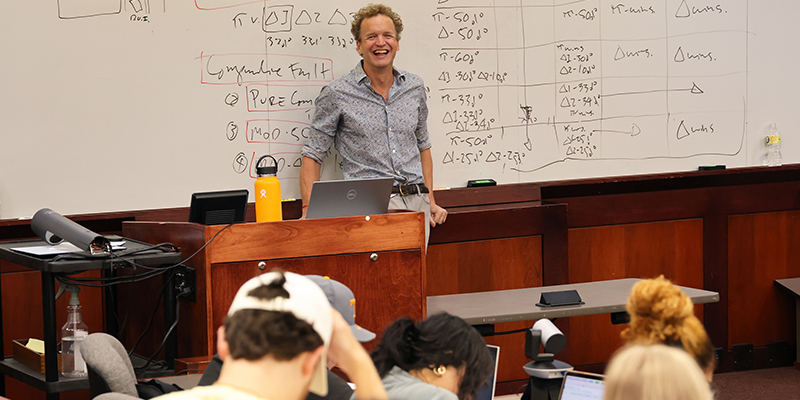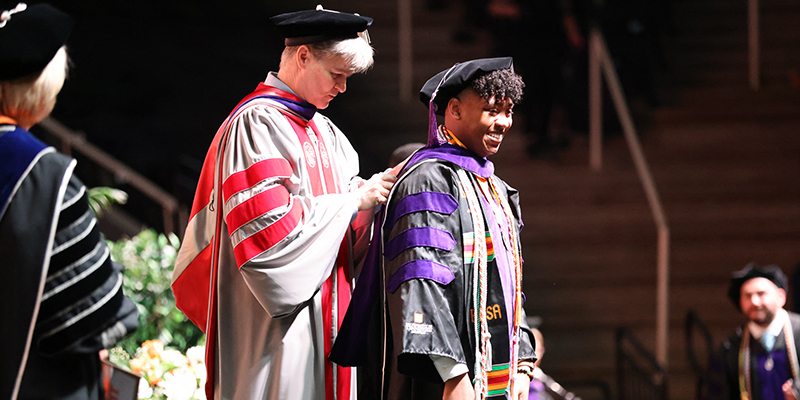TENNESSEE LAW: LIGHTING THE WAY
OUR VISION
To be the premier law school in the southeast, distinguished by our influential scholarship, commitment to public service, and exceptional preparation of future lawyers to be ethical and skilled leaders within the profession.



STRATEGIC PLAN
Goal 1 - Educate and Prepare Students
Educate and prepare students at the highest level to resolve legal problems, serve clients, promote justice, and be leaders in the profession and in their communities.
Goal 2 - Lead the Way
Strive to lead the way in conducting influential, collaborative, and innovative research that advances collective understanding of the law, supplies practical solutions to real-world problems, and leads to meaningful reforms to our local and national legal landscapes.
Goal 3 - Embody the Volunteer Spirit
Embody the Volunteer Spirit by providing education, legal assistance, advice, and leadership training to communities across Tennessee and beyond, and by actively pursuing and serving in public interest positions at the local, state, and national levels.
Goal 4 - Robust Learning Environment
Recruit and retain a diverse and highly talented group of students, faculty, and staff with varying perspectives and viewpoints, and cultivate a learning environment that is robust, engaging, and inclusive in working towards the ultimate objective of building a more just society.
Goal 5 - Increase Awareness
Increase promotion of and awareness about the College of Law’s vision, strengths, and achievements to raise our regional, national, and international profile.



TENNESSEE LAW:
LIGHTING THE WAY
OUR VISION
To be the premier law school in the southeast, distinguished by our influential scholarship, commitment to public service, and exceptional preparation of future lawyers to be ethical and skilled leaders within the profession.

STRATEGIC PLAN
Goal 1 - Educate and Prepare Students
Educate and prepare students at the highest level to resolve legal problems, serve clients, promote justice, and be leaders in the profession and in their communities.
Goal 2 - Lead the Way
Strive to lead the way in conducting influential, collaborative, and innovative research that advances collective understanding of the law, supplies practical solutions to real-world problems, and leads to meaningful reforms to our local and national legal landscapes.
Goal 3 - Embody the Volunteer Spirit
Embody the Volunteer Spirit by providing education, legal assistance, advice, and leadership training to communities across Tennessee and beyond, and by actively pursuing and serving in public interest positions at the local, state, and national levels.
Goal 4 - Robust Learning Environment
Recruit and retain a diverse and highly talented group of students, faculty, and staff with varying perspectives and viewpoints, and cultivate a learning environment that is robust, engaging, and inclusive in working towards the ultimate objective of building a more just society.
Goal 5 - Increase Awareness
Increase promotion of and awareness about the College of Law’s vision, strengths, and achievements to raise our regional, national, and international profile.
Degree Programs
The Juris Doctor (JD) degree is your ultimate goal as a law student. In your pursuit of a JD, you can choose from one of our two concentrations and earn a second graduate degree through one of our joint-degree programs.
If you’re interested in earning your JD in less than three years, you have a few options to consider at UT Law. These options will allow you to graduate by the fall of your third year—one semester earlier than usual. View two of our sample accelerated curricula.
Students may choose to specialize in either in Advocacy and Dispute Resolution or Business Transactions.
J.D./MBA – Business
J.D./MA – Philosophy
J.D./MPH – Public Health
J.D./MPPA – Public Policy & Admin.
This program allows flexibility for students who cannot commit to full-time study. While the traditional course load for first-year law students is between 14 and 16 hours of class credit per semester over three years, the flexible schedule option allows students to take a reduced load of 10 credit hours their first semester, and 11 hours during their second.
UT 3+3 is an accelerated dual-degree program offered by the College of Law and the College of Arts and Sciences, which saves students an entire year of tuition and related costs, without sacrificing quality of education. In the program, students complete three years of approved undergraduate coursework in the College of Arts and Sciences. Following their third year, participating students admitted to the College of Law become full-time, first-year law students. The first year of law study will count toward a student’s law degree and also toward the completion of his or her bachelor’s degree. Two additional years of law study follow, after which a student earns a juris doctor degree.
Our program is designed for individuals whose careers intersect with the law but who do not need to earn a law degree. The program provides knowledge of the law and problem-solving skills that will enable graduates to more effectively deal with legal matters in their jobs.
Centers, Institutes, & Programs
At UT Law’s Bettye B. Lewis Career Center, our goal is to add value at every step of the professional journey—whether you’re a law student, alumnus, or an employer, we reduce the complexity, frustration, and risk in meeting your professional goals.
UT Law takes its responsibility to the judicial system seriously. Through its visionary Center for Advocacy and Dispute Resolution, the college offers an academic concentration in Advocacy and Dispute Resolution designed to prepare students for the rigors of the practice of law. The concentration’s tailored curriculum engages students in experiential learning through simulations and real-world experience, helping them master a variety of lawyering skills. Courses are taught by a highly respected and experienced full-time faculty with diverse backgrounds, as well as adjunct faculty who are members of the state and federal bench and bar. In addition to curricular offerings, the center sponsors frequent multidisciplinary symposia, lectures, and special events on emerging legal issues in which students, lawyers, judges, and other professionals participate. Learn more.
The Clayton Center for Entrepreneurial Law seeks to improve the training of business lawyers in both transactional and litigation practices through the Concentration in Business Transactions for JD candidates, the LLM program in United States business law, Transactions: The Tennessee Journal of Business Law, a visiting professor program, faculty and student scholarship, field placement opportunities, the Business Law Clinic, the Trademark Clinic, the Homer A. Jones Jr. Wills Clinic, and presentations for the business bar and community, both regionally and nationwide. Learn more.
The Institute for Professional Leadership helps students develop their leadership skills and professional values through interdisciplinary programming beyond a strictly legal context. The institute hosts courses and practicums in public service and leadership and develops extracurricular programming in leadership and professional development, including collaboration with the college’s Bettye B. Lewis Career Center. Learn more.
Lawyers are professional writers. Whether it be a letter, a motion, a brief, a complaint, a contract, or any of the other multiple documents attorneys are frequently asked to prepare, lawyers spend much of their professional career writing. A lawyer who cannot write effectively is greatly handicapped in his or her ability to represent clients. Through the Legal Writing Program the college takes seriously its role in training students to become effective legal writers. Learn more.
Through this student-driven pro bono program, as well as funding opportunities for students who engage in public interest work, the college is committed to expanding opportunities in public service. This dedication is manifested in UT Pro Bono’s active student involvement, faculty support, and a staff position dedicated to addressing access-to-justice issues. Learn more.
The college’s Mentoring Program offers law students the opportunity to establish a mentoring relationship with a professional in the field. Mentors help students identify and fulfill professional goals while fostering the highest levels of ethics and professionalism. Through these interactions, attorney participants can serve the profession and the community. Students gain new perspectives and insights into issues related to civility, ethics, and professionalism. Learn more.
Accreditation
The University of Tennessee College of Law is approved by the Council of the Section of Legal Education and Admissions to the Bar of the American Bar Association, 321 North Clark Street, Chicago, IL 60654, 312-988-6738
Fully approved law schools undergo a full site evaluation every ten years. The next site visit for the University of Tennessee College of Law will take place during the 2032-33 academic year.
Founded in 1890, the University of Tennessee College of Law prepares tomorrow’s lawyers through clinical and skills training, innovative classroom teaching, legal writing, and professional values. UT Law is accredited by the American Bar Association and is a charter member of the Association of American Law Schools. The vision for our college includes:
Preparing Students for Practice
Throughout the curriculum, we prepare students by training them to solve complex legal problems, represent clients skillfully and to confront injustice, and meaningfully contribute to their communities.
Intellectual Engagement
We are an engaged and curious intellectual community, committed to high-quality scholarly inquiry and production, and to the advancement and exploration of knowledge and ideas.
Service
As part of a land-grant institution, we serve the state, the legal profession, and the broader community.
Professionalism
We are dedicated to integrity, honesty, candor, and fairness.
A Diverse and Inclusive Community
We foster a culture of compassion and empathy, listen and endeavor to understand different perspectives and act on what we learn, celebrate diverse people and ideas, and strive to create a sense of belonging for everyone by cultivating an atmosphere in which all members of our community feel supported, respected, and included.